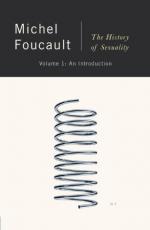
|
| Name: _________________________ | Period: ___________________ |
This test consists of 15 multiple choice questions and 5 short answer questions.
Multiple Choice Questions
1. According to Foucault, the role of the family unit is NOT:
(a) To be a social structure that restrains sexuality.
(b) Allow alliance and sexuality to effect each other.
(c) To anchor sexuality and give it support.
(d) All of the above.
2. What major transformation in sexuality happened at the turn of the nineteenth century?
(a) The focus on sexuality went from everlasting punishment after death to a medical problem of illness in life.
(b) Perversions were defined and recognized.
(c) The biological study of sexuality discovered hormones and thus explained perversions medically.
(d) The population openly accepted sexual discourse as necessary for a healthy sexuality.
3. What does the juridico-discursive model of power say about desire?
(a) It is created by prohibition.
(b) None of the above.
(c) It is not affected by repression.
(d) It finds ways to work through existing channels of power.
4. Which of the following was NOT something that was seen as being influenced by sex?
(a) The soul.
(b) The health and well being of the body.
(c) The welfare of future generations.
(d) The political influence.
5. According to Foucault, which of the following is NOT one of the ways we view sex?
(a) As having been repressed for centuries.
(b) As something obscure that needs to be investigated and understood.
(c) As something not to be taken into account.
(d) As something with influence over every aspect of our lives.
6. What do the rules of continual variations state?
(a) Reistance arises from changing sources even when it remains constant.
(b) Each representation of power is unique and varying from those surrounding it.
(c) Power manifests itself in matrices of transformations, and not static relationships.
(d) There are an unlimited number of possible power relationships.
7. What does Foucault say was an issue in the four strategies of power in regards to sexuality?
(a) An attempt to mask the more indiscreet, conspicuous and intractable aspects of sexuality.
(b) A struggle against sexuality.
(c) The production of sexuality.
(d) An attempt to gain control of sexuality.
8. What does the hysterization of women's bodies refer to?
(a) The identification of the female body as being at the root of female mental instability.
(b) The notion that the women's bodies are extreme manifestations of male counterparts.
(c) The notion that women's bodies are hightly sexual and was predisposed to medical pathology.
(d) The discovery that women's bodies created more emotional reaction than male bodies.
9. What relationship does Foucault give to governmental powers and law?
(a) The law is one of many tools used by governmental powers.
(b) The law constrains the power of the governments.
(c) Governments exercise power through law, and the law is the seat of their power.
(d) The power mechanisms of law and government constantly clash are are kept concealed.
10. How would you best describe the strategy in which sex plays a vital role?
(a) A single, all-encompassing strategy.
(b) One of reproductive function.
(c) There is no single one, but many.
(d) The matrimonial relations.
11. Which of the following is a statement made by Foucault?
(a) The format of the confessional is our best remedy to repression.
(b) Sexuality has been repressed by the general consent of the populace.
(c) Scientia sexualis is a more valid and evolved pursuit of truth than ars erotica.
(d) Western societies did not manifest the movement of a power that was essentially repressive.
12. Which of the following statements regarding power would Foucault likely agree with?
(a) All of the above.
(b) Power is not something that is acquired, seized, or shared.
(c) Power comes from below.
(d) Relations of power are not in a position of exteriority with respect to other types of relationships.
13. Attempt at regulation, or the deployment of alliance, of sexuality had what important effect?
(a) Regulation helped spread the sexual discourse and hence sexuality.
(b) Constrained sexuality to marital relations.
(c) Gave power to institutionalized strategies.
(d) Generated perversions.
14. Which words would Foucault use to explain power?
(a) Random and nonsubjective.
(b) Linear and overt.
(c) Intentional and linear.
(d) Intentional and nonsubjective.
15. Which of the following would Foucault agree what the purpose for which the deployment of sexuality was first established.
(a) The self affirmation of the affected class.
(b) The underscoring of the high value and price of the body, sensations, and pleasure.
(c) All of the above.
(d) The body, vigor, longevity and descent of the upper class.
Short Answer Questions
1. What does Foucault say is true of discourse?
2. What does the rule of double conditioning state?
3. Which of the following definitions of sexuality would Foucault likely endorse?
4. Which statement would Foucault agree with?
5. Which of the following best describes the pedagogization of children's sex?
|
This section contains 898 words (approx. 3 pages at 300 words per page) |

|




